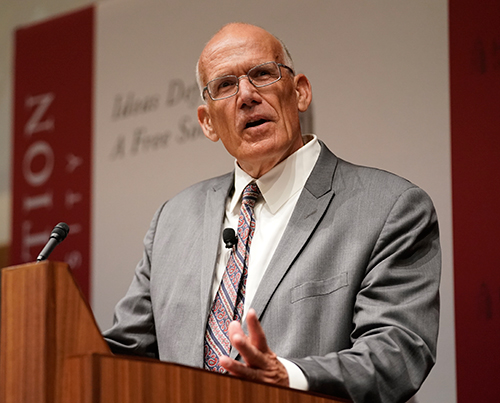风萧萧_Frank
以文会友维克多·戴维斯·汉森:美国对华及大国战略
https://www.hoover.org/news/victor-davis-hanson-us-strategy-china-great-powers
维克多·戴维斯·汉森 2018年10月15日
美国应运用实力、联盟和三角战略,以最佳方式应对新兴的“大国”竞争世界。

胡佛学者维克多·戴维斯·汉森表示,美国应运用实力、联盟和三角战略,以最佳方式应对新兴的“大国”竞争世界。
汉森在接受采访时表示,随着以经济为主导的中国的崛起及其全球霸权外交政策,后冷战时代的全球秩序正在发生变化。
汉森是胡佛研究所马丁和伊利·安德森高级研究员,研究和撰写古典文学和军事史著作。他是胡佛研究所“军事史在当代冲突中的作用”工作组主席,该工作组于10月初召开会议,讨论美国是否正在进入一个新的大国格局。大国是指在全球范围内施加影响力的主权国家,其影响力可能来自军事、经济、外交或所谓的“软”实力手段。
“精心策划”
汉森将中国的崛起描述为在经济和国家安全领域“精心策划”的。因此,这使得美国及其在二战后领导的国际体系成为日益强势的中国的攻击目标,而中国如今已成为世界第二大经济体。
汉森表示:“除了美国及其盟友之外,没有其他真正的障碍能够阻碍中国实现其设想中的角色。”
美国决策者认为,自“9·11”事件以来,恐怖主义被广泛认为是美国的主要安全关切;然而,他表示,中国如今已在多个方面超越了这一威胁。
“随着叙利亚伊斯兰国(ISIS)几近覆灭,以及伊朗及其恐怖分子附属组织日益孤立,流氓国家和恐怖阴谋集团的局限性如今显而易见。因此,民族国家重新获得了其先前在全球恐怖分子面前的重要性。全球化赋予了一些国家一些尖端武器,赋予它们原本无法通过自身成功获得的影响力,”汉森说道。
他表示,非美国大国按重要性依次为中国、俄罗斯、欧盟、日本和印度。
“美国与后三个国家关系良好,与前两个国家关系则不那么密切。不幸的是,尽管俄罗斯拥有被大肆宣传和令人羡慕的‘软实力’,但俄罗斯拥有6500枚核武器,中国拥有庞大的经济和人口,以及不断增长的国防预算,这使得它们在某种程度上成为全球参与者,而远比欧洲、日本和印度等更成功、更人道的社会则没有,”他说道。
战略与结盟
汉森表示,古老的均势、联盟和三角关系是美国应对其他强大竞争对手最有效的手段。
“例如,中国和俄罗斯永远不应将自己视为比美国更亲密的朋友。遗憾的是,围绕俄罗斯勾结的恐慌阻碍了我们切实地利用俄罗斯来制衡中国,反之亦然。错误的决策导致两国在朝鲜、伊朗和中东问题上走得更近,而我们却因此付出了代价。”
汉森表示,在其他方面,美国应该与澳大利亚、日本、菲律宾、韩国和台湾结盟,以遏制中国的侵略,并防止任何认为美国的盟友需要核武器来保护自己免受中国威胁的想法。
他表示,用今天的眼光来看,“超级大国”有着许多经典的特征。这包括拥有超过3亿人口、拥有核武器、独立的战略空军、远洋海军,以及跻身世界前五或前六的经济规模。“按照这些综合计算,我们是唯一的超级大国,但中国正在快速崛起,”他指出。
更多复杂性,更少存在性
汉森认为,今天的美国状况更好,因为两个竞争的超级大国(美国和前苏联)不太可能将冲突升级为核战争。
“话虽如此,该地区仍有许多拥有核武器的竞争大国——中国、印度、巴基斯坦、俄罗斯、朝鲜——它们不受任何超级大国的束缚,对其行动选择也没有任何约束,”他说道。
汉森说,这些国家之间存在着许多边界问题以及其他类型的“尖锐而古老的分歧”。
他指出,虽然美苏之间不存在涉及两万多枚核武器和两种截然相反的信仰体系的生死攸关的断层线,但如今存在着更多复杂性和爆发毁灭性地区战争的可能性。
“在某些方面,中国比前苏联更难以预测,因此也更危险,”他说,“而且考虑到其经济和人口规模,中国也更具适应能力,实力也更强。”
其发展水平远超苏联,其全球霸权蓝图是多方面的,并不一定建立在失败的意识形态之上。
汉森表示,近几十年来,西方社会犯下了严重的错误,认为“软实力”能够威慑侵略性国家。
“我认为,我们在21世纪看到了20世纪许多流行观念的缺陷,这些观念包括希望“软实力”与硬实力相提并论(欧盟的经济和声誉无法阻止普京干预他想干预的事情),希望全球财富必然导致民主化和自由化(这在中国显然没有实现),以及希望全球机构将取代民族国家(联合国和国际刑事法院既缺乏民主国家的权力,也缺乏民主国家的道德)。”他说道。
最后,汉森指出,美国领导人错误地认为,美国可以先发制人地入侵其他国家,推翻独裁者,以避免灾难和威胁——并在事后奇迹般地“使失败国家的残余民主化”。
他说:“阿富汗、利比亚、伊拉克和叙利亚尽管偶尔会平静下来,但看起来永远不会像卡梅尔,甚至底特律或芝加哥那样。”
Victor Davis Hanson: US Strategy On China, Great Powers
https://www.hoover.org/news/victor-davis-hanson-us-strategy-china-great-powers
Victor Davis Hanson October 15, 2018
The United States should use a strategy of power, alliances, and triangulation to best navigate the emerging world of “great power” rivalries。
The post-Cold War global order is in flux with the ascendency of an economically-driven China and its foreign policy of global hegemony, said Hanson in an interview.
Hanson, the Martin and Illie Anderson Senior Fellow at the Hoover Institution, studies and writes about the classics and military history. He is the chair of the Hoover Institution’s Working Group on the Role of Military History in Contemporary Conflict, which met in early October to discuss whether the United States is entering a new great power landscape. A great power is a sovereign state that exerts influence on a global scale, whether through military, economic, diplomatic or so-called “soft” power methods.
“Calibrated and Planned”
Hanson describes China’s rise as “calibrated and planned” in the areas of economics and national security. As such, this puts the United States and the international system it led after World War II in the crosshairs of an increasingly assertive China, which now has the world’s second largest economy.
“There is no other real impediment to China’s envisioned role other than the US and its allies,” said Hanson.
Since 9/11, terrorism was widely considered America’s chief security concern, according to US policymakers; however, China has now eclipsed that threat on more fronts than one, he said.
“The limitations of rogue states and terrorist cabals are now apparent with the near destruction of ISIS in Syria and the growing isolation of Iran and its terrorist appendages. So, nation states have regained their prior importance over global terrorists. And globalization has given a number of states some sophisticated weaponry that gives them clout otherwise not earned by their own success,” Hanson said.
The ranks of non-American great powers, in descending order of importance, are China, Russia, the European Union, Japan, and India, he said.
“The US enjoys good relations with the latter three; not so much with the former two. Unfortunately for all the ballyhooed and enviable ‘soft power,’ Russia’s 6,500 nuclear weapons and China’s huge economy and population, and growing defense budget make them global players in a way the far more successful and humane societies of Europe and Japan, and India as well, do not,” he said.
Strategies, Alignments
The ancient methods of balance of power, alliances, and triangulation are the most effective means for the United States to deal with other great rival powers, Hanson said.
“For example, China and Russia should never consider either a closer friend than each does respectively the US. It is a pity that the hysteria over Russian collusion has prevented us from a realist use of Russia to balance at times China and vice versa. Poor decisions have brought the two closer together at our expense vis-á-vis North Korea, Iran, and the Middle East,” he added.
On other fronts, the United States should be aligning with Australia, Japan, the Philippines, South Korea, and Taiwan to deter Chinese aggression, and to ward off any idea that America’s allies will need nuclear weapons to protect themselves from China, Hanson said.
A number of classical distinctions mark “superpowers” in today’s terms, he said. This includes having a population over 300 million, the possession of nuclear weapons, an independent strategic air force, a blue-water navy, and an economy in the world’s top five or six. “By these inclusive calculations, we are the only superpower, but China is gaining fast,” he noted.
More Complexities, Less Existential
Hanson believes America is better off today because it is less likely that two rival superpowers (the United States and the former Soviet Union) would escalate conflict toward a nuclear war.
“That said, there are a number of rival regional powers with nuclear weapons—China, India, Pakistan, Russia, North Korea—that are not beholden to any superpower and have no restraint whatsoever on their choices of action,” he said.
Those countries have a number of border and other sorts of “sharp and ancient disagreements,” Hanson said.
While there are no existential Soviet-American fault lines involving 20,000 plus nuclear weapons and two antithetical belief systems, today more complexities and opportunities for devastating regional wars exist, he noted.
“China in some ways is a much less predictable and thus more dangerous rival than the old Soviet Union,” he said, “and is far more adaptable and powerful, given that its economy and population dwarf those of the Soviet Union, and its blueprint for global hegemony is multifaceted and not necessarily invested in a failed ideology.”
Western societies in recent decades made critical mistakes assuming “soft power” could deter aggressive states, Hanson said.
“I think we saw in the twenty-first century the shortcomings of a number of popular twentieth-century ideas from the hope that “soft power” was comparable to hard power (the EU economy and reputation cannot stop Putin from intervening where he wishes), that global wealth invariably leads to democratization and liberalization (it certainly did not in China), and that global institutions will replace the nation state (the United Nations and International Criminal Court lack both the power and morality of democratic nations),” he said.
Finally, Hanson noted America’s leaders erroneously believed that the United States could preemptively invade countries and remove dictators in order to stave off disasters and threats—and in the aftermath somehow miraculously “democratize the detritus of failed states.”
He said, “Afghanistan, Libya, Iraq, and Syria, despite occasional calm, do not seem they are ever going to look like Carmel or even Detroit or Chicago.”




